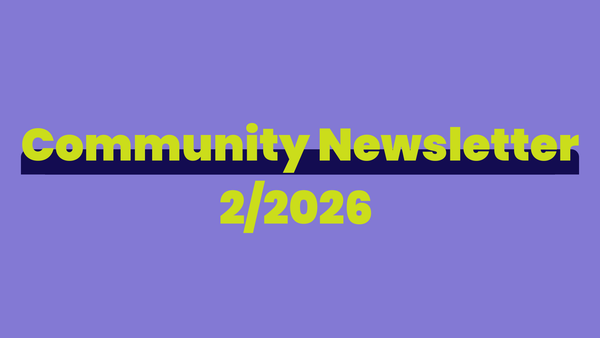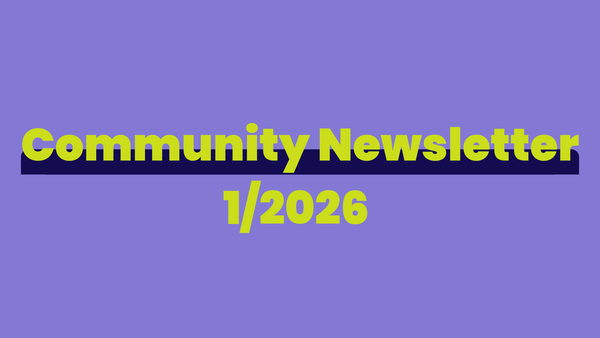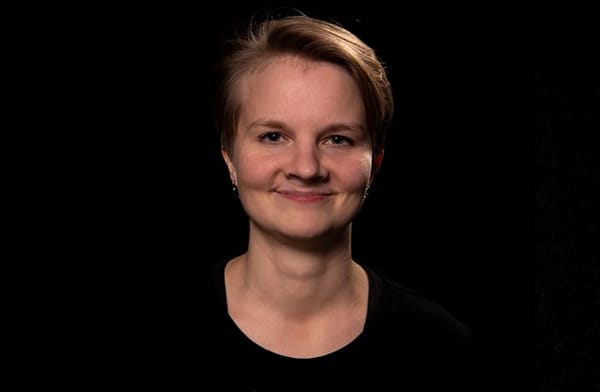Coming Out – Without Borders

This article was originally posted in Familia Ry's blog.
June is Pride Month – a time to celebrate love, freedom, and the right to be ourselves. This year’s Helsinki Pride theme, “Without Borders,” reminds us that human rights, including the right to self-expression and safety, must not be limited by geography, culture, or prejudice.
At Familia and Herizon, we recognize how challenging coming out can be, especially for those in intercultural families or communities where being LGBTQIA+ is still taboo.
In this deeply personal blog, Michael Suhonen, currently doing a work try-out at Familia, shares his journey of coming out, healing, and finding pride after trauma. His story shines a light on the realities many still face, and how support, visibility, and community can break barriers.

Without borders explained
Pride 2025 has explained this year’s theme as “Everyone must have the right to freedom, pride, and self-determination. At Helsinki Pride Community, we defend these values and recognize no borders or boundaries when it comes to human rights – they belong to everyone. Finland is not just a country where people are born; it must also be a place that welcomes those fleeing persecution due to their sexual orientation, gender identity, or gender expression”. (Pride Helsinki, 2025)
Cultural norms and coming out
When I think of the theme without borders, the 1st hurdle in my mind is generally the acceptance of yourself and then the process of communicating this to others (if you choose!). Borders are closed when someone is not able to voice their own sexual identity, which limits freedom and expression. That's why this blog focuses on coming out, to break down barriers and allow the individual to open more borders to expression and freedom.
In Familia some of our inter-cultural families come from backgrounds where being LGBTQ+ is taboo, sometimes even illegal and can have consequences for the individual and their families. Identifying as queer in certain countries has deep seated problematic roots that shift forward from generation to generation and may often be controlled and shut down by governments and authorities.
‘Queer’ is an umbrella term for people who are not heterosexual or are not cisgender. There are many terms and expressions for sexuality, and these can be found to help you discover where you identify, some countries ban these terms but in Finland we are lucky enough to have freedoms to talk openly about these in many public and private organizations.
When you feel you might know how to describe what your sexual identity is, you might be ready to express this to others. This is a process known as ‘coming out’. Coming out refers to the process of sharing one's sexual orientation or gender identity with others. It is a personal and individual decision, and there are various ways to do it. Coming out, is a wholly individual process that requires you to share only the information you choose to.
You can come out as just one part of your identity at a time, or all at once, you can come out to only one person or to all the people you're close to, to the whole world, or anything in between. There are no rules.
The idea of coming out can feel like it would be a very daunting task. It's something you're never obligated to do at all if you don't want to, but if it does sound like a good idea to you, then this blog with provide you with the tools you need to do so in a safe manner that feels healthy for you – read on.
With borders – coming out after mental trauma
Everyone's story is different. We all experience different experiences when coming out, some people choose to never do so because of the safety they are up against, the borders that are closed to them, or just through individual preference.
My story about coming out is personal but I would like to share it here. I was born in 1980 in this affluent middle class predominantly white area in the South of England, UK. My childhood was idyllic you could say, unified family, surrounded by countryside, rivers and watermills, a small steam railway, small churches, boutique shops and these perfect houses all lined up in different colours with all the traditions aligned to them. Perfect.
In this small market town, anything ‘different’ was strange to people. It was not that you had to conform a certain way but there were a set of tacit rules and norms that everyone followed.
In the 90s throughout the UK, we had a rule set by a right winged prime-minister Margaret Thatcher called Section 28. This law stated that a local authority could not intentionally promote homosexuality or publish material with the intention of promoting homosexuality. Nor could they promote any teaching in any maintained school of the acceptability of homosexuality as a pretended family relationship.
This still gives me chills.
When I started to finally realise that I could be gay, because of the section 28 law, my school that I went to was unable to talk about anything LGBTQ+ related. It was simply not discussed.
I was being physically bullied (mentally and physically) almost every day whilst at school from the age of 13 to 17 years old, where people perceived me as different, from the way I spoke, walked, looked. These were precious years that caused me deep mental trauma and loneliness because I wasn't able to come out in a safe space. I lost many friends during that period of my life because of peer reputation.
I didn’t realise my own sexuality at the time, but it was being assumed on me by others, because there was no exposure to it, and the topic wasn’t being talked about in schools or at home. Like anything, talking about something in a positive way can normalise things and start making people aware. Otherwise, there is just prejudice, and people fear something they might see in themselves or cannot understand. Because it wasn't talked about, people were not able to deal with it properly, especially if there are sets of tacit rules and social norms and going against these resulted in violence.
How did this affect me coming out?
After I left the school and the violence had stopped, I was no longer in flight or fight mode and had a chance to start thinking about my own sexual identity. When you are in a place of violence you are unable to think properly and looking after your basic mental and physical needs becomes vital for survival. It is only when violence stops you have space to think. That's why if you are in a violent situation, you must seek support in some way.
I grew up in a loving family unit so for me this was easier than perhaps if you do not have this initial support. I took a gamble and poured out all the feelings and anxiety I felt. Bottled up. I came out as gay.
Looking back, it was a very surreal and long night, full of tears and emotions, but luckily my family accepted me. They still do love me to this day, because their love was stronger than their convictions. In my case I realised later that no-matter whom I loved, they didn’t have convictions towards me. I thought they would have convictions because my experience of being gay were beaten out of me at school. I did not realise at that time that there was a lot of love and goodness in the LGBTQ+ community, which I was to discover later in my adulthood.
It was only after I came out, I had time to then deal with the severe emotions that I had accumulated in school, OCD, PTSD and feelings of despair were a fraction of what I felt. Others may unfortunately go through these and more, which can lead to terrible things happening, such as suicide attempts, which because of a lack of communication and awareness can cause the person to feel they no longer have hope.
It is important to remember that there is hope and to seek help immediately if you are going through feelings like this. We are all on a different journey to heal and to feel accepted and you are not alone.
How do queer youth navigate coming out and what support systems can help?
However you identify and whatever group you feel you belong to there is help and support for you. Each family is different; in a perfect world there would be no issues with coming out. However, not all families are the same and mentioned above it depends on how many borders are open or closed to you.
To facilitate a positive experience that is best for your mental and emotional wellness, it makes the most sense to first come out to whomever you know to be free of homophobia, transphobia, or prejudice towards any other identity you may wish to share. Other people who you know share your identity are your safest bet if you happen to be close to any.
My advice and what seems to be a common theme online is that you should always talk to someone who is in a supportive role before you make any decisions to ‘come out’. This could be a helpline, a local community group or even close friends or if you feel comfortable to do so, your family.
It is a good idea to have support behind you to begin with. Support and volunteer groups (general or specific to how you identify) may also help you with what you need to say and how to reassure your family. They might prepare you and give you a strategy if you need to get out and what to do afterwards if it goes wrong. If you live in Finland, you will be able to have a lot of support here, as much as you need.
If you don’t want to ‘come out’ to your family, you do not have to.
There are many people who live a free lifestyle without doing this. You may be an adult reading this who wants to ‘come out’ but is not sure how to. Either way Pride and other organizations in Helsinki 2025, fight to show people who are in Finland that being part of the LGBTQ+ community is welcomed and together without borders, are a family and are open and supportive should you choose to come out, you will receive help!
Compiled is a list of places that can help.
Community and resources
- Seta ry LGBTQ+ help and advice: Seta ry – English
- Pride Helsinki: Etusivu - Helsinki Pride Helsinki Pride
- Youth Helsinki: LGBTQAI+ activities - Youth Helsinki
- Trans resources: Finland | Trans Resources
- LGBTQ+ Counselling: LGBTQ+ Therapy in Helsinki for Gay, Lesbian, & Queer
- Switchboard: Homepage | Switchboard
- LGBT Foundation: Helpline & Email Support – LGBT Foundation
- Pride chat: Gay Chat- talk with online strangers | PrideLocation
- Pride Helsinki list of helplines: Support and Advice - Helsinki Pride
This article is authored by Michael Suhonen and published originally in the Familia Ry blog. Michael is currently doing a work try-out at Familia as the office secretary, and has a strong background in customer service, customer experiences, hospitality, entrepreneurship and events.





